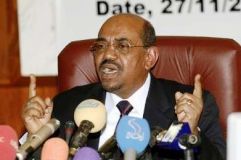African Union must control UN-AU Darfur force – Sudan
March 9, 2007 (UNITED NATIONS) — Sudanese president Omar al-Beshir, in a letter to UN chief Ban Ki-moon seen here Friday, insisted that the African Union (AU) must remain in control of any joint peacekeeping mission with the UN in Darfur.
 The four-page letter, in response to Ban’s request to send an initial force of 2,300 peacekeepers to Darfur to pave the way for a joint AU-UN force of more than 20,000 troops, also stressed the need to re-energize the flagging Darfur peace agreement (DPA).
The four-page letter, in response to Ban’s request to send an initial force of 2,300 peacekeepers to Darfur to pave the way for a joint AU-UN force of more than 20,000 troops, also stressed the need to re-energize the flagging Darfur peace agreement (DPA).
Beshir’s main reservations centered on UN plans to bolster African Union peacekeepers in strife-torn Darfur, with the Sudanese leader stressing that the proposals must be in line with provisions of the DPA signed by Khartoum and the main Darfur rebel group last May.
He said some aspects of Ban’s plan “need to be clarified.”
“Our understanding of the United Nations support packages (meant to pave the way for the large-scale UN-AU mission) is that the UN will provide technical, logistical, financial expertise and civil and military consultants with rank below that of the military commander appointed by the African Union,” the Sudanese leader said in his letter dated March 6.
“In phase three, the AU forces implementing that phase, in terms of control or command, must remain forces of the African Union supported by the United Nations as per the two packages,” he added.
The Sudanese envoy proposed that a tripartite commission grouping Sudan, the AU and the UN meet to resolve the issue and ensure that the UN plan is aligned with the DPA.
Under the AU-UN agreement reached last year, the estimated 2,300 UN troops are to bolster ill-equipped and cash-strapped AU forces in the medical, signals, engineering, logistics, aviation, reconnaissance and transport fields.
Marie Okabe, the UN deputy spokeswoman, told a press briefing Friday that the Beshir letter, written in English, was received Thursday along with a 14-page annex in Arabic that is now being translated.
“The letter itself contains some positive elements, including a strong expression of support for the joint African Union-UN efforts to re-energize the political process and some assurances with regard to humanitarian assistance to the people of Darfur,” Ban’s deputy spokeswoman said.
“But it also contains some elements which seem to challenge the agreement reached last November in Addis Ababa and Abuja on peacekeeping in Darfur,” she added.
Okabe said the letter and the annex would be reviewed “before Ban consults with the UN Security Council on the next step.”
In his letter, Beshir underscored the need to revive and accelerate the political process within the framework of the DPA, which he described as “the reference upon which the UN should found and deliver its proposed support packages.”
“It is important that those opposing peace in Darfur be pressured as called by the AU Peace and Security Council and the UN Security Council,” he noted.
He also warned that “proposals that tend to amend, nullify or suspend any article of the DPA will not be acceptable as it may reopen discussions over issues that were previously settled with difficulty.”
He expressed full support for the mediation efforts jointly being undertaken by UN special envoy Jan Eliasson and his AU counterpart Salim Ahmed Salim to re-energize the DPA.
Beshir also pledged support for the humanitarian efforts by the UN and other relief agencies and vowed “to extend all necessary and possible facilitations through an energized fast track.”
The so-called “hybrid” AU-UN force is meant to take over peacekeeping in Darfur from the 7,000 AU troops who have failed to stop the bloodshed in the western Sudanese region.
The war in Darfur erupted in February 2003 when rebels from minority tribes in the vast western province took up arms to demand an equal share of national resources, prompting a heavy-handed crackdown from Sudanese government forces and their Janjaweed proxy militia.
According to UN estimates, 200,000 people have been killed and 2.5 million displaced.
(AFP)
